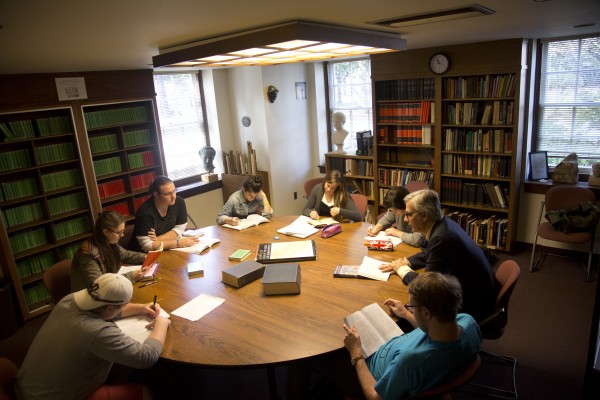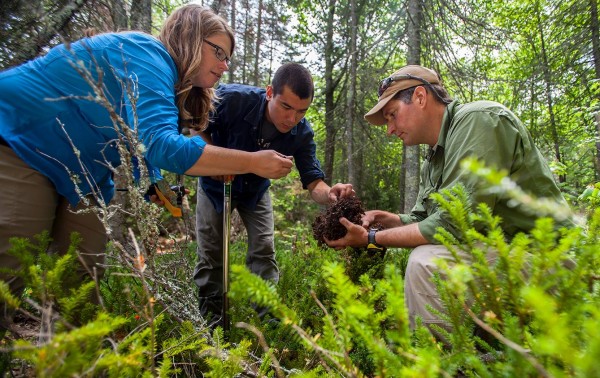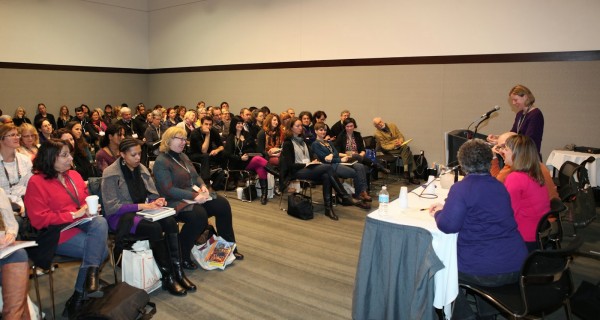EcoLeague Faculty
Over 400 faculty members bring a diversity of expertise, research interests, teaching experience, and life lessons to the EcoLeague. Through the EcoLeague consortium, faculty have many opportunities to collaborate with one another on curricula, pedagogy, research projects, and scholarship. Faculty are encouraged to learn about one another and explore potential EcoLeague collaborations. Contact your EcoLeague Faculty Representative and/or the EcoLeague Consortium Director for more information.
Collaboration Opportunities
Curriculum
Through the EcoLeague, faculty members can collaborate on syllabi, lectures, labs, and more within and across disciplines. Faculty can co-teach a course either in-person or remotely. Faculty can engage in pedagogical discussions on the faculty listserv or just by picking up the phone and calling an EcoLeague colleague.
Past Curricular Collaborations Have Included:
- Course: Sustainable Business and Community in Vermont
- Course: Natural and Cultural History of Maine’s Coastal Islands
- Course: Natural and Cultural History Interpretation of the Apostle Islands
- Academic Student Certificate: Water Resources Management
Additionally, Prescott College is always looking for co-instructors for its Grand Canyon Semester course.
Research Projects
In addition to teaching, many EcoLeague faculty members are engaged in active social and ecological research projects with faculty and/or students at both their home institution and other EcoLeague colleges. Many of the member colleges offer access to research and learning facilities, including APU’s Kellogg Farm, Dickinson College’s archaeology laboratories, Northland College’s Applied Research and Environmental Laboratory and Prescott College’s Kino Bay Center for Cultural and Ecological Studies.
Scholarship
Faculty members can attend conferences together to present their research and promote the EcoLeague. They can collaborate on publications, workshops, and/or funding proposals.
To promote collaboration throughout the consortium, the EcoLeague offers its Conference Connections program, which offers reimbursement to faculty and staff attending academic conferences to meet up with fellow EcoLeaguers for a meal or coffee/tea. Please see our grant section below for more details on this new program.
Faculty Exchanges
Much like the student exchange, the EcoLeague Scholar in Residence program encourages faculty-to-faculty interactions. While in the past this program has mostly involved short (3-14 day) visits, Northland College and Dickinson College participated in the first extended faculty exchange in 2015-2016. EcoLeague faculty members may also choose to visit another college during their sabbatical. During these visits, the visiting faculty member may meet with others in their field, present a guest lecture, work with students on various projects, among other activities. Upon arriving to their home college, faculty members are asked to discuss their experience with their colleagues via an informal presentation.
To learn more about exchange opportunities, contact the EcoLeague Consortium Director
Faculty Development Grant Program
Faculty Development Grant Program exists to promote collaborative teaching, curricular development and scholarly opportunities for EcoLeague faculty members. To help encourage and facilitate collaboration, faculty have access to grant funding to support faculty-initiated and collaborative curricular initiatives and creative research or service projects across the member colleges.
Grant Award Criteria
To be eligible for consideration, projects must:
- Involve faculty from at least two EcoLeague institutions;
- Highlight interdisciplinary, integrative, experiential or applied approaches;
- Result in a linked class, collaborative course, curricular program proposal, scholarly or creative presentation or publication;
- Include a plan for continued sustainability of the initiative, when appropriate.
Guidelines (maximum 3-pages)
Narrative grant proposals should be three pages or less and must include the following:
- Project title;
- Names, titles, and home institutions of the project participants;
- Overview of project and a description of its significance;
- Goals, objectives and outcome(s) of the project;
- Implementation plan and timeline;
- Budget (including costs associated with the project and stipends, if applicable).
Typically, grant awards will not exceed $3,500.
Due Dates & Submission
Applications for EcoLeague Faculty Development Grant Program are accepted and reviewed on a rolling basis.
Grant proposals should be converted into a PDF and mailed to coordinator@ecoleague.org.
Questions may also be forwarded to the coordinator.
Recent Grant Projects
Snow Science Collaborative Programming
Faculty: David Lovejoy (Prescott College) and Eeva Latosuo (Alaska Pacific University)
This grant covered the development of a collaborative Snow Science curriculum. Funding included travel and accommodation costs for the primary faculty to visit each other’s campus to meet with key administrators, staff, and other faculty involved in the development of the program, along with a partial stipend for additional workload in the creation of this project. The resulting pilot program launched in the 2016-2017 academic year and spans both campuses.
A Case Study of Changing Land Ownership in Northern Wisconsin
Faculty: Davis Taylor (College of the Atlantic), Brandon Hofstedt (Northland College), and Jonathan Martin (Northland College)
This grant funded the creation of an interdisciplinary working team to craft proposals for funding to address the issue of changing forest ownership, along with the collection of case studies of the effects of deindustrialization of northern forests on rural economies. Funding enabled Professor Taylor to visit Northland College in fall 2015, and provided a small stipend for research support for the faculty team, culminating in shared course modules dealing with forest ecology, forest economics, and regional community sustainability.
Conference Connections
Attending a professional conference? Connect with a colleague from an EcoLeague college for lunch or dinner, and EcoLeague will pick up the tab.
To promote relationship building and collaborations among EcoLeague colleges, the EcoLeague consortium will reimburse faculty and staff who connect for a meal while they are attending a conference or workshop.
To make a conference connection, send a message to coordinator@ecoleague.org identifying yourself, your EcoLeague institution and position, the conference you will be attending, and when you will be in attendance at the conference.
The EcoLeague Consortium Director will track conference connections requests and notify you if colleagues from other EcoLeague colleges will be attending the same conference.
Faculty Reps
Alaska Pacific University
Michael Kaplan
907-564-8634
mkaplan@alaskapacific.edu
College of the Atlantic
Sarah Hall
shall@coa.edu
Dickinson College
Jorden Hayes
717-254-8303
hayesjo@dickinson.edu
Northland College
Alissa Hulstrand
ahulstrand@northland.edu
Cait Livsey
clivsey@northland.edu
Prescott College
Peter Sherman
928-350-1014
peter.sherman@prescott.edu
New College of Florida
Heidi Harley
941-487-4328
harley@ncf.edu



